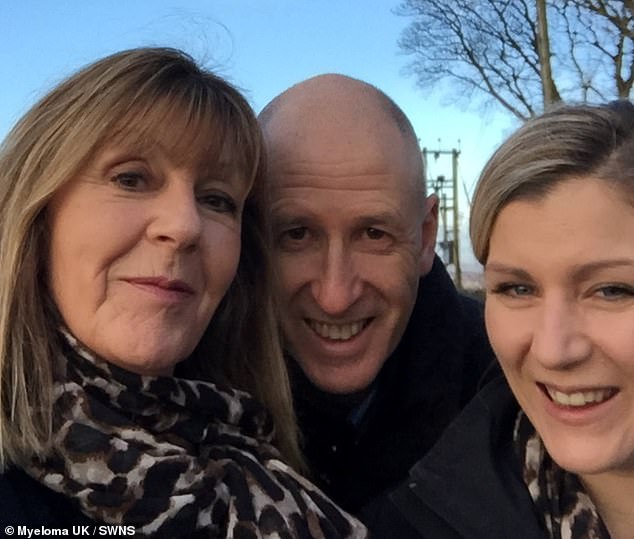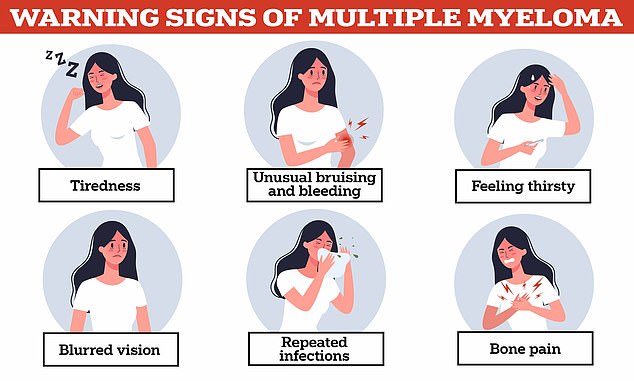The devastated stepdaughter of a ‘healthy and fit’ man who died of deadly cancer within two weeks of being fobbed off by doctors has urged GPs to be more aware of subtle symptoms.
Ronnie Haston, 68, died unexpectedly in April 2024 just two weeks after being diagnosed with the blood cancer myeloma.
He’d only begun feeling unwell just a fortnight before his diagnosis, suffering constipation, muscle weakness and extreme fatigue.
‘He just didn’t look right,’ said his daughter Beth Hunt, a 42 year-old nurse from East Calder.
He sought help from the GP about his symptoms, but was sent away with laxatives to treat the constipation, and was told he must wait two weeks for a blood test.
But his health quickly declined, and his wife Anne rushed him to A&E for urgent care.
In the hospital, tests found his kidney function had plummeted to just 14 per cent and he had extremely high calcium levels—both warning signs of serious blood problems.
He was eventually diagnosed with myeloma, a deadly type of blood cancer that originates in the bone marrow, where blood cells are created.

Ronnie Haston, 68, died unexpectedly in April 2024 following a myeloma diagnosis, only two weeks after he was admitted to hospital
If diagnosed at early stages, when the disease has not spread around the body, around 80 per cent of patients will live for at least five years.
But at later stages this drops to around 40 per cent.
‘He was fit and healthy, he had no underlying health conditions. It was a complete shock to us all,’ Ms Hunt said of his diagnosis.
Doctors assured the family they had a ‘full plan’ and that Mr Haston would start chemotherapy and be a good candidate for a stem cell transplant.
But during his two rounds of chemotherapy he developed life-threatening pneumonia, which eventually resulted in multiple organ failure.
He died within two days of becoming ill with the lung disease.
Shortly before his death, Mr Hunt had been making plans for his retirement with his wife.
‘He didn’t get to enjoy one day of retirement with my mum or do any of the future they had planned together.

Mr Haston was dealing with some constipation, which his GP gave him laxatives for. But he was also really fatigued with muscle weakness and ‘just didn’t look right’. Above, his wife Anne Haston (left) and stepdaughter Beth Hunt (right)

His wife took him to A&E—where tests found his kidney function had plummeted to just 14 per cent and he had extremely high calcium levels. He was eventually diagnosed with myeloma, a deadly a type of bone marrow cancer
‘If Ronnie hadn’t been so unwell by the time he got into hospital, he would have been in a better position to fight it,’ said Ms Hunt.
Symptoms of the disease—which include back pain, broken bones, fatigue, and recurring infection—are often missed and instead linked to just general ageing or minor conditions and injuries.
Constipation is a lesser-known symptom, caused by a build up of calcium in the blood triggered by the cancer.
Ms Hunt added: ‘It’s not people’s fault, it’s the system’s fault. The catalogue of errors, the wait. We kept saying, “he needs a blood test”, but he couldn’t get one for two weeks.
‘In this day and age how is that acceptable? If somebody is unwell, you need the blood test now. Even in hospital, it was all too little too late. The big thing for me is educating GPs.’
In honour of her stepfather, mum-of-two Beth has started a JustGiving page and decided to run the Edinburgh Marathon to raise money for Myeloma UK.
There are an estimated 6,000 new cases of myeloma per year in the UK, with more than 35,000 in the US.
It occurs due to changes in immune system cells called plasma cells, which replicate at a faster rate and cause a host of problems.

There are an estimated 6,000 new cases of myeloma per year in the UK, with more than 35,000 in the US
It’s often called multiple myeloma because it can be found in several places — wherever there is bone marrow.
While chemotherapy can reduce the number of myeloma cells, doctors aren’t yet able to eradicate them completely.
Speaking of her upcoming marathon challenge Ms Hunt said: ‘I know I can do at least half but I’ll probably have to push through the last six miles.
‘I tend to run at night when my husband’s here and the children are sleeping. I think of Ronnie and my mum when I run – the last year without him has been awful for her.
‘If she can wake up without him and can put one foot in front of the other then I can take it one step at a time too.’









